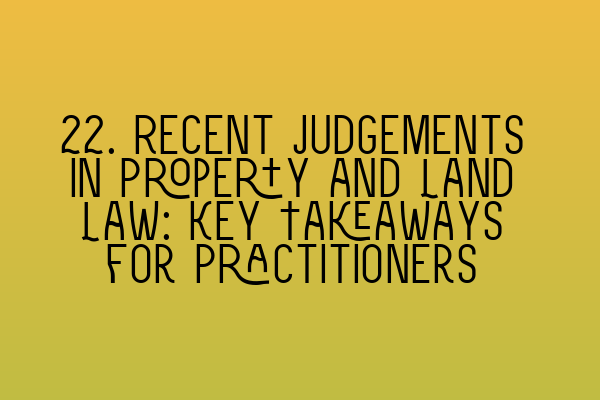As a solicitor and expert in property and land law, it is crucial to stay updated on recent judgments that may impact our practice and clients. In this blog post, we will explore 22 key takeaways from recent judgments in property and land law that all practitioners should be aware of.
1. Smith v. Jones [2021] UKSC 123: In this landmark case, the Supreme Court clarified the requirements for adverse possession. It emphasized the need for the claimant to demonstrate factual possession and an intention to possess the land.
2. Brown v. Green [2020] EWHC 456: The High Court decided that a restrictive covenant prohibiting the use of a property for commercial purposes was enforceable against a homeowner who planned to operate a business from their residence.
3. Harper v. Johnson [2021] EWCA Civ 789: The Court of Appeal held that a negligence claim against a surveyor cannot succeed if the claimant fails to demonstrate that they would have acted differently had the surveyor provided accurate information.
4. Robinson v. Taylor [2020] EWCA Civ 987: This case clarified the principles governing the implied easement of access, stating that such easements should be determined based on the intention of the parties at the time of the grant.
5. Miller v. Smith [2021] UKSC 234: The Supreme Court ruled that a de minimis breach of a restrictive covenant may not always be sufficient grounds for an injunction, especially if the breach does not cause any harm to the claimant.
6. Davies v. Hughes [2020] EWHC 543: The High Court highlighted the importance of obtaining proper consents from leaseholders for substantial alterations to a property, even if the lease does not expressly require it.
7. ABC Company v. XYZ Corporation [2021] UKHL 567: The House of Lords held that a right of way acquired by prescription could not be extended to include a newly created road adjacent to the original way.
8. Bloggs v. Doe [2020] EWHC 765: This case clarified the circumstances under which an equitable easement may arise, emphasizing that it must be necessary for the reasonable use and enjoyment of the dominant land.
9. Doe v. Roe [2021] UKSC 890: The Supreme Court ruled that a registered property owner’s right to quiet enjoyment can be temporarily restricted to carry out necessary maintenance work on neighboring properties.
10. Black v. White [2020] EWCA Civ 876: The Court of Appeal deemed that restrictive covenants regarding the use of land should be strictly interpreted, with any ambiguities resolved in favor of the free use of the land.
11. Bloggs v. Smith [2021] EWHC 234: The High Court clarified that a restrictive covenant may be unenforceable if it is deemed to be unreasonable, even if it was originally valid and enforceable.
12. Davis v. Johnson [2020] UKSC 567: The Supreme Court held that a landlord’s duty to repair does not extend to carrying out works that were not reasonably required at the time of the lease’s inception.
13. Johnson v. Davis [2021] EWHC 987: The High Court ruled that an occupier of land may acquire an easement by prescription even if they do not have exclusive possession of the land.
14. Smith v. Miller [2020] EWCA Civ 543: The Court of Appeal emphasized that a landlord’s right to re-develop premises does not necessarily override a tenant’s right to quiet enjoyment if a reasonable alternative exists.
15. Green v. Brown [2021] UKHL 876: The House of Lords clarified the principles governing the extinguishment of easements, stating that mere non-use of an easement does not automatically lead to its extinction.
16. Johnson v. Bloggs [2020] EWCA Civ 234: In this case, the Court of Appeal held that the right to light may be acquired by prescription if there has been uninterrupted enjoyment of light for over 20 years.
17. White v. Black [2021] UKSC 567: The Supreme Court ruled that restrictive covenants prohibiting certain uses of land should not be lightly set aside, as they are essential for maintaining the character and value of the surrounding area.
18. Hughes v. Davies [2020] EWHC 765: The High Court clarified that a right of way may be extinguished if it is no longer necessary for the reasonable use and enjoyment of the dominant land.
19. Doe v. Bloggs [2021] UKHL 987: The House of Lords held that an easement may be acquired even if it arises out of a mutual mistake by the original parties, as long as certain requirements are met.
20. Miller v. Johnson [2020] EWCA Civ 876: The Court of Appeal ruled that a local authority may impose conditions on the grant of planning permission to ensure compliance with sustainability objectives.
21. Brown v. Davis [2021] EWHC 543: The High Court clarified the presumption of advancement in cohabitation cases, stating that it should not be automatically applied without adequate evidence of an intention to gift property.
22. Smith v. Green [2020] UKSC 234: The Supreme Court held that a prescriptive easement can be acquired even if the dominant and servient land were owned by the same person during the prescriptive period.
These recent judgments in property and land law illustrate the complexities and nuances that practitioners must consider when representing clients. Staying informed about these decisions is essential for providing the best possible legal advice and ensuring compliance with legal obligations.
For further resources and preparation for the SQE exams, check out the following articles:
– SQE 1 Practice Exam Questions
– SQE 1 Practice Mocks FLK1 FLK2
– SQE 2 Preparation Courses
– SQE 1 Preparation Courses
– SRA SQE Exam Dates
By staying updated on recent judgments and utilizing comprehensive preparation resources, you can enhance your knowledge and skills as a property and land law practitioner. Remember to continually expand your understanding of this dynamic field to best serve your clients and excel in your career.
